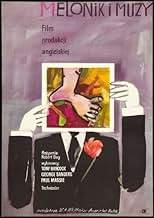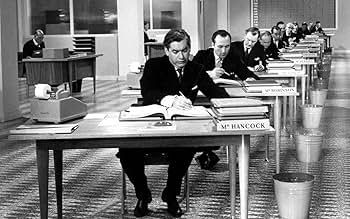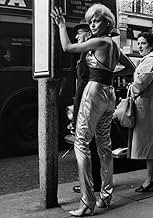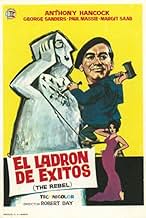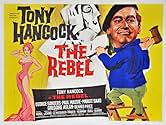The Rebel
- 1961
- 1h 45m
IMDb RATING
6.8/10
1.3K
YOUR RATING
Tony Hancock gives up his day job to become an artist. He's a lot of enthusiasm, but little talent, and critics dislike his work. Nevertheless, he impresses a talented artist.Tony Hancock gives up his day job to become an artist. He's a lot of enthusiasm, but little talent, and critics dislike his work. Nevertheless, he impresses a talented artist.Tony Hancock gives up his day job to become an artist. He's a lot of enthusiasm, but little talent, and critics dislike his work. Nevertheless, he impresses a talented artist.
- Nominated for 1 BAFTA Award
- 1 nomination total
Gary Cockrell
- Artist
- (as Gary Cockerill)
Featured reviews
Tony is trapped in the drudgery of a 9-5:30 office job. But at night he is an artist who has great talent and vision (he believes). When he decides to quit his job and move to France he falls in with a group of artists who admire the `childlike' quality to his work. However when he passes another artists work off as his own and gets signed by a major agent he begins to get over his head in trouble.
For fans of Hancock's Half Hour on the BBC this film will represent strange new ground an extension of the short concise stories with depression being the overriding source of Hancock's comedy. Here the story sees him less put down and more of a winner this removes a lot of what made him funny.
However the story still has wit as Hancock makes fun of the pretentious art crowd and makes fun of his own inability to paint. However the running time is perhaps too long to sustain and much of the comedy is such that it could easily have been done by anyone rarely is Hancock's unique style allowed material to work with.
Hancock is still good though, and him misfiring is still funny. George Sanders has an interesting role and it's always good to see John Le Mesurier in anything. However at times you can't help feeling that Sid James could have been added somewhere. In fact the whole film would have been better modelled around the format of the TV and radio shows.
Overall this is the film failing it is stretched and, for most of the second half, it's comedy is not the usual Hancock fare that so many loved. It's funny but it'll make you seek out tapes and videos of his classic shows.
For fans of Hancock's Half Hour on the BBC this film will represent strange new ground an extension of the short concise stories with depression being the overriding source of Hancock's comedy. Here the story sees him less put down and more of a winner this removes a lot of what made him funny.
However the story still has wit as Hancock makes fun of the pretentious art crowd and makes fun of his own inability to paint. However the running time is perhaps too long to sustain and much of the comedy is such that it could easily have been done by anyone rarely is Hancock's unique style allowed material to work with.
Hancock is still good though, and him misfiring is still funny. George Sanders has an interesting role and it's always good to see John Le Mesurier in anything. However at times you can't help feeling that Sid James could have been added somewhere. In fact the whole film would have been better modelled around the format of the TV and radio shows.
Overall this is the film failing it is stretched and, for most of the second half, it's comedy is not the usual Hancock fare that so many loved. It's funny but it'll make you seek out tapes and videos of his classic shows.
For anybody with a love for Handcock this film is a must see. For those who really know Handcock it is also a farewell as in many ways it could be seen as his last true work? Coming at a time when Handcock was desperately trying to re-invent himself and re mould his style whilst fighting off the blackness of depression the film is a mixture of hope and sadness. If you look behind the laughter and mirth you can see Hancock as he really is - a one of genius never to be repeated. Hancock plays a struggling artist who leaves his London office job to seek his fame and fortune in Paris. Look for the great line between himself and his Landlady Mrs Cravat when Hancock exclaims "Its a self portrait" Mrs Cravat looks and him and asks "Of who?" Handcock is at the end of his line "Who do you think Laurel and Hardy" Lol The film has the usuall Galton and Simpson tight story line and the action is very funny. In my opinion a film which in ever way is on a par with the carry on style genre. Enjoy you wont see the likes of Tony again!
I am 57 now and was weaned when I was a lad on the various BBC tv series of "Hancock's Half Hour in the 1950's.I became an addict there and then.In later life I carefully recorded the repeats on my vcr (not invented when I was a lad), and purchased cassettes of Tony's earlier radio shows whenever a new volume was available for sale.I have read his biography (1924 - his suicide in Australia in 1968), so he was only 44 when he died.Forget he had a drink problem and could be violent.
Yes, he considered he had outgrown his tv series with Sid James (and Kenneth Williams earlier) and even his later solo "Hancock" tv series from 1959 onwards.As a previous literate reviewer has rightly remarked, he hankered after a wider international audience for his comic abilities and appeared in later films like "Those Magnificent Men in their Flying Machines" even trying his hand in Hollywood with Walt Disney but I consider "The Rebel" from 1961 as his funniest film.It incorporates many characters like the existentialist lady on the big screen who have been heard before, e.g. Fenella Fielding in the radio show "The East Cheam Poetry Festival" from 1954.John le Mesurier often played "establishment" figures in his half hour shows and was a personal friend and here he plays Hancock's authoritarian boss in the dreary office where we first see him in an almost synchronised early scene where the clerks all do a similar computation function simultaneously.How we office workers with aspirations of individual creativity empathise with him in his rebellious behaviour!!
A new "Mrs Cravatte" in the shape of Irene Handle (not Patricia Hayes who was merely a char lady in the tv series), provides a female comic foil as Tony's landlady.It is interesting he retains his real name in this feature film, presumably he considered he could effectivly develop his bohemian character from the tv onto the broader canvas.I revisited this film after 20 years or so and laughed out loud in several places.The point already made that American/overseas viewers may be perplexed with his humour is easy to understand and our current UK generation may be left cold by it.My generation however which was reared on a diet of post war food rationing, spivs, watching wealthy Americans in the media, the McMillan type establishment figures in politics and industry, trends in fashion, pop music etc; can so empathise with his humour.I gave it 7/10.
Yes, he considered he had outgrown his tv series with Sid James (and Kenneth Williams earlier) and even his later solo "Hancock" tv series from 1959 onwards.As a previous literate reviewer has rightly remarked, he hankered after a wider international audience for his comic abilities and appeared in later films like "Those Magnificent Men in their Flying Machines" even trying his hand in Hollywood with Walt Disney but I consider "The Rebel" from 1961 as his funniest film.It incorporates many characters like the existentialist lady on the big screen who have been heard before, e.g. Fenella Fielding in the radio show "The East Cheam Poetry Festival" from 1954.John le Mesurier often played "establishment" figures in his half hour shows and was a personal friend and here he plays Hancock's authoritarian boss in the dreary office where we first see him in an almost synchronised early scene where the clerks all do a similar computation function simultaneously.How we office workers with aspirations of individual creativity empathise with him in his rebellious behaviour!!
A new "Mrs Cravatte" in the shape of Irene Handle (not Patricia Hayes who was merely a char lady in the tv series), provides a female comic foil as Tony's landlady.It is interesting he retains his real name in this feature film, presumably he considered he could effectivly develop his bohemian character from the tv onto the broader canvas.I revisited this film after 20 years or so and laughed out loud in several places.The point already made that American/overseas viewers may be perplexed with his humour is easy to understand and our current UK generation may be left cold by it.My generation however which was reared on a diet of post war food rationing, spivs, watching wealthy Americans in the media, the McMillan type establishment figures in politics and industry, trends in fashion, pop music etc; can so empathise with his humour.I gave it 7/10.
Tony Hancock was the biggest British comedian of the late 50s and early 60s. Viewing his two (not entirely representative) films and watching (and listening) to his "Half-Hour" comedy shows (running separately, if concurrently, on BBC television and radio), young people (those under 35 or so) will probably find this fact baffling unless they are extraordinarily well-informed about social conditions in immediately postwar Britain. There also seems to be a kind of gender barrier. Women of my acquaintance, even those that satisfy the fairly stringent criteria I detail in my previous sentence, seem to have found Hancock uniformly unfunny.
Hancock's humour, it must be said, was unconventional. It is entirely driven by the dialectic, if you will, between character and situation. Hancock loathed gags, and forbade his scriptwriters (usually the brilliant duo of Ray Galton and Alan Simpson) to indulge in them. It is also exceptionally restricted in time (late 50s), social class ("shabby-genteel" lower-middle) and place (the south-east of England). Yet Hancock, who bestrode Britain like a colossus in his heyday, nurtured the powerful delusion that he could succeed in America.
It would take an amazing act of empathy on the part of an American to penetrate Hancock's humour as displayed in his radio and TV shows. As a technician he was flawless, possessing a sense of comic timing unequalled by anybody in Britain except the probably equally unexportable Kenneth Williams (perhaps best known outside the UK because of his strong involvement in the "Carry-On" series of films). Needless to say, Hancock and Williams, the two greatest British comedians of all time, loathed and vilified each other.
"The Rebel" (pointedly re-christened "Call Me Genius" in the America Hancock was desperate to impress) was released to great disappointment in 1961. In hindsight it has gained in favour, its initial cool reception a matter of some puzzlement.
Hancock, in the film, is an office drudge who harbours artistic ambitions way beyond his hopelessly limited technical skills. However, he jettisons his boring day-job to share an artistic garret in Paris (only 200 or so miles from London) with a frustrated, but genuinely talented, young artist (Paul Massie). Hancock's infantile daubs are hailed as works of genius in the pretentious circles he inhabits. Galton and Simpson's screenplay wastes no opportunity to satirise the credulity of the modern-art world, and its unfailing capacity to court lucrative charlatans.
Can those outside the British Isles understand this film? I hope so. The office environment and lodgings Hancock occupies are stultifying, but the artistic world of Paris is shown to be as corrupt and foolish in its own way (NB. the identically uniformed "Existentialists", indistinguishable, in a sense, from their bowler-hatted counterparts with whom Hancock works in central London). Art does get a slightly better press in this film than commerce, since the possibility of genuine artistic talent (i.e. Paul's (Hancock's young flatmate and protégé)) is acknowledged. Nevertheless, the presence of trend-hungry buffoons within the artistic world (e.g. George Sanders' art dealer) indicates the interpenetration of the commercial and artistic worlds. Is art-dealing George Sanders any less a despicable entrepreneur than Hancock's erstwhile manager in his City of London counting-house, John le Mesurier?
Although we speak essentially the same language (I think the differences are often over-stated), cultural barriers remain between the UK and the US. However, Americans would do well to look closely at Tony Hancock, partly for his intrinsic value, and partly for the huge influence, conscious and unconscious, he has wielded over the British psyche (here I controversially include Ireland, which remains culturally close to the UK). His second feature-film ("The Punch And Judy Man"), while telling in its own way, is less valuable overall, both inside the UK (and its satellites) and beyond.
Hancock's humour, it must be said, was unconventional. It is entirely driven by the dialectic, if you will, between character and situation. Hancock loathed gags, and forbade his scriptwriters (usually the brilliant duo of Ray Galton and Alan Simpson) to indulge in them. It is also exceptionally restricted in time (late 50s), social class ("shabby-genteel" lower-middle) and place (the south-east of England). Yet Hancock, who bestrode Britain like a colossus in his heyday, nurtured the powerful delusion that he could succeed in America.
It would take an amazing act of empathy on the part of an American to penetrate Hancock's humour as displayed in his radio and TV shows. As a technician he was flawless, possessing a sense of comic timing unequalled by anybody in Britain except the probably equally unexportable Kenneth Williams (perhaps best known outside the UK because of his strong involvement in the "Carry-On" series of films). Needless to say, Hancock and Williams, the two greatest British comedians of all time, loathed and vilified each other.
"The Rebel" (pointedly re-christened "Call Me Genius" in the America Hancock was desperate to impress) was released to great disappointment in 1961. In hindsight it has gained in favour, its initial cool reception a matter of some puzzlement.
Hancock, in the film, is an office drudge who harbours artistic ambitions way beyond his hopelessly limited technical skills. However, he jettisons his boring day-job to share an artistic garret in Paris (only 200 or so miles from London) with a frustrated, but genuinely talented, young artist (Paul Massie). Hancock's infantile daubs are hailed as works of genius in the pretentious circles he inhabits. Galton and Simpson's screenplay wastes no opportunity to satirise the credulity of the modern-art world, and its unfailing capacity to court lucrative charlatans.
Can those outside the British Isles understand this film? I hope so. The office environment and lodgings Hancock occupies are stultifying, but the artistic world of Paris is shown to be as corrupt and foolish in its own way (NB. the identically uniformed "Existentialists", indistinguishable, in a sense, from their bowler-hatted counterparts with whom Hancock works in central London). Art does get a slightly better press in this film than commerce, since the possibility of genuine artistic talent (i.e. Paul's (Hancock's young flatmate and protégé)) is acknowledged. Nevertheless, the presence of trend-hungry buffoons within the artistic world (e.g. George Sanders' art dealer) indicates the interpenetration of the commercial and artistic worlds. Is art-dealing George Sanders any less a despicable entrepreneur than Hancock's erstwhile manager in his City of London counting-house, John le Mesurier?
Although we speak essentially the same language (I think the differences are often over-stated), cultural barriers remain between the UK and the US. However, Americans would do well to look closely at Tony Hancock, partly for his intrinsic value, and partly for the huge influence, conscious and unconscious, he has wielded over the British psyche (here I controversially include Ireland, which remains culturally close to the UK). His second feature-film ("The Punch And Judy Man"), while telling in its own way, is less valuable overall, both inside the UK (and its satellites) and beyond.
This one is a long-time favourite for its great one-liners, its wit, its bright colours and the sheer joy of its performances. George Sanders plays the creepy critic with the same finesse he'd done many times before, Hancock as the leader of the Infantile school of painting is so preposterous its hysterical, even a very young Oliver Reed appears briefly in the cafe scene. The writing of Galton and Simpson is as sharp as ever but gets to take more detours and turns than it ever could in the Half-Hours ... a brilliant film. I particularly love the pathetic painting of the foot which crops up at the art exhibition and that hideous sculpture. Excellent.
Did you know
- TriviaThe film was a critical and commercial disaster in the United States.
- GoofsWhen the two bodyguards appear on the luxury yacht their shirts are buttoned and unbuttoned showing vests underneath.
- Crazy creditsThe producers wish to acknowledge the fullest co-operation accorded - somewhat apprehensively - by BRITISH RAILWAYS.
- ConnectionsEdited into Urban Myths: Les Dawson's Parisienne Adventure (2020)
- SoundtracksAt Last ! At Last !
(L'Âme des Poètes)
(uncredited)
Music by Charles Trenet
French lyrics by Charles Trenet
English lyrics by Florence Miles
- How long is Call Me Genius?Powered by Alexa
Details
- Release date
- Country of origin
- Languages
- Also known as
- Call Me Genius
- Filming locations
- Bingham Road railway station, Addiscombe, Croydon, London, England, UK(Fortune Green South Station)
- Production company
- See more company credits at IMDbPro
- Runtime
- 1h 45m(105 min)
- Aspect ratio
- 1.66 : 1
Contribute to this page
Suggest an edit or add missing content

